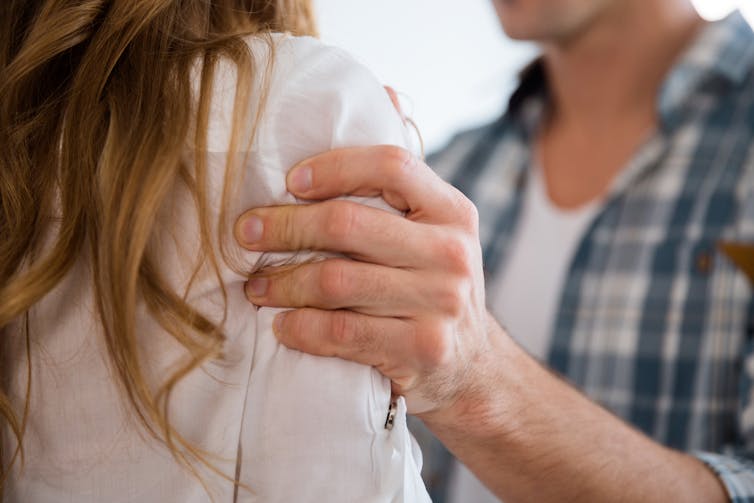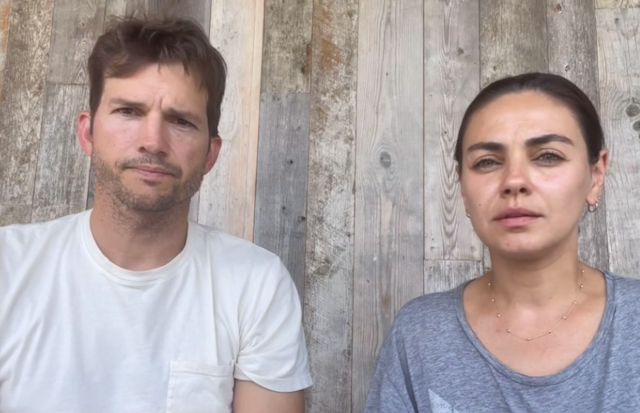Hollywood actors Ashton Kutcher and Mila Kunis are in hot water after their letters of support for their friend and former co-star, Danny Masterson, were made public. Masterson, who played Steven Hyde on That ’70s Show, was convicted in May of drugging and raping two women in the early 2000s. He was sentenced to 30 years to life in prison on Sept. 7.
Kutcher and Kunis, who are married, apologized for their letters of support after they came to light, and said they didn’t think they would be seen by anyone but the judge. Many other colleagues and friends wrote letters of support for Masterson at the behest of his family, including the actors who played the parents Kitty and Red Forman on the show.
The strong backlash against Kutcher and Kunis is partly because Kutcher is a well-known anti-trafficking and anti-rape activist and has been vocal in his support of the #MeToo movement. Kutcher and Kunis have stepped down from their roles in an anti-child-sex-abuse organization that he co-founded.
Their letters of support, however, show an astounding lack of empathy for the victims of Masterson’s crimes. They also illustrate one of the main rape myths still plaguing society: the notion that good men don’t rape.
Good men don’t rape?
In their letters to the judge, Kutcher and Kunis asked for Masterson to be shown leniency based on his supposedly good character (because he is a friend, a good husband and father, and an anti-drug role model). In doing so, Kutcher and Kunis undermine the victims’ testimony and their own claim they support victims.
If they did actually believe Masterson had drugged and raped the two victims, they wouldn’t be writing about his “innate goodness” as Kunis did. In asking for leniency for their friend, they inadvertently gave him a pass for his behaviour and cast doubts on the women’s claims.
The presumption that someone who is a good friend, husband and father cannot rape is one of the insidious ways that victims of assault are undermined. We see it in university settings when perpetrators are popular or student athletes and blame is put on the victims, not the perpetrators. The sympathy is with the perpetrator, not the victim. The victim is ostracized, not the perpetrator.
Philosopher Kate Manne has called this phenomenon “himpathy.” As American actor Christina Ricci stated, “People we know as ‘awesome guys’ can be predators and abusers. It’s tough to accept but we have to. If we say we support victims — women, children, men, boys — then we must be able to take this stance.”
The myths about rape culture
Rape culture is defined as a society or organizational culture where sexual assault is normalized, minimized or excused based on myths about rape. Political analyst Shannon Sampert highlights six myths in her research on media coverage of sexual assault:
Women lie about being raped. Studies show that in 90 to 98 per cent of cases, women are telling the truth.
Women are to blame for the assault. Think about the slut shaming and victim blaming we often read of when women are asked what they were wearing and how much they had to drink.
Men can’t control themselves. This stems from a false argument that men just can’t control themselves when things get going.
Females are becoming the perpetrators. This myth is usually based on stories of women in authority positions, like teachers, grooming young men and boys. While such cases do occur, the number is very small.
Rapists are “Others.” Think about media coverage when perpetrators are racialized men. In the United Kingdom, for example, rhetoric about grooming gangs has taken a particularly racial tone. Coverage tends to focus on the perpetrators’ ethnic or religious background and suggests rape is more prevalent in certain racialized communities. However, evidence shows this is not the case.
Finally, and most relevant in the Masterson case, the myth that “good” men don’t rape. This is a common and detrimental idea that gives men a pass if they are somehow seen as worthy of sympathy or have some kind of status in the community.
Victims are told they will ruin a perpetrator’s life. They also risk being ostracized when they accuse a popular man of sexual assault.
Because these myths about rape permeate our society, these harmful ideas get passed on from generation to generation even with all the consent education now out there. Because our society wants to protect the perpetrators of violence, not the victims.

Sexual double standards
Women are often blamed for their own sexual assault, not believed or the crime committed against them is seen as not that serious. These ideas can be traced back to two ideas which I explored in my research with sex workers: the sexual double standard between men and women, and the good girl/bad girl dichotomy between women themselves.
These deep-seated preconceptions about the appropriate sexual behaviour of men and women are connected to faulty myths about rape culture. Women who have a lot of sex are shamed as sluts. Men who do so are celebrated as studs — that’s an example of the sexual double standard.
The sexual double standard then leads to the good girl/bad girl binary which blames those deemed bad for any poor treatment they suffer, even in the case of rape. After all, says the rape myth, she must have done something to have provoked the assault. Condemning women for their sexuality undermines their autonomy and leads to the victim blaming we see in many sexual assault cases.
Would Kutcher and Kunis have apologized if their letters had not become public? Maybe, or maybe not. Nonetheless, their claims to support victims rung hollow the moment they asked the judge to disregard the seriousness of the crime and give their friend leniency. The judge, rightly, declined to do so.

